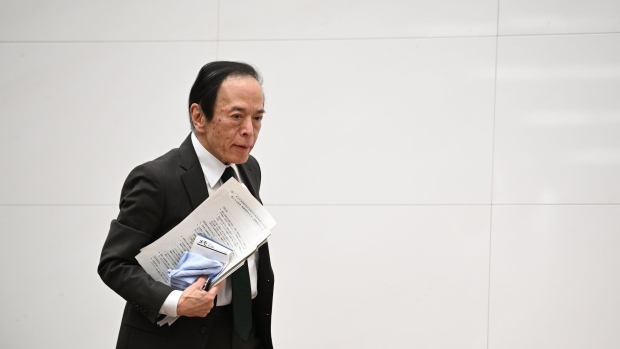Apr 19, 2024
BOJ’s Ueda Reiterates Policy to Remain Accommodative for a While
, Bloomberg News

(Bloomberg) -- Bank of Japan Governor Kazuo Ueda reiterated monetary policy will stay accommodative for a while as policymakers continue to buy government bonds.
The BOJ would eventually reduce its bond buying at an unspecified timing in the future, he told an audience at the Peterson Institute for International Economics in Washington on Friday.
But it judged it was “dangerous” to completely remove its bond market intervention in March, when it raised interest rates for the first time in 17 years and ended its yield curve program, he added. The remarks come a week before the central bank is set to wrap up its next policy meeting and upgrade growth and price projections.
Ueda said the BOJ will proceed cautiously, while noting that it’s likely to raise interest rates further if the underlying price trend improves.
Wages Hikes
Ueda explained the BOJ’s policy shift in March, saying the strongest wage hikes in decades had helped to boost the probability of hitting the BOJ’s price target enough to justify the policy shift.
In a media interview earlier this month, Ueda hinted at a chance of a rate hike in the second half of this year by highlighting the likelihood of improvements in the inflation trend. The recent acceleration in the yen’s depreciation may push that timeline forward, according to economists.
The pace of core inflation has now stayed at or above the BOJ’s 2% target every month for two full years, but the BOJ says it still sees some distance from anchoring the goal in a sustainable manner.
On Friday, Ueda gave no hint on the timing of the next interest move.
Some 41% of economists in a Bloomberg survey forecast October to be when the BOJ next raises rates. All 54 economists except for one predict no policy change at the central bank’s meeting next week.
Ueda said the BOJ policy shift, as well as recent currency market developments, had been a popular topic of conversation with other officials in Washington, where he attended the spring meetings of the International Monetary Fund and World Bank.
Japanese Finance Minister Shunichi Suzuki and top currency official Masato Kanda voiced concerns about the yen’s weakness in Washington this week, which market participants see as a way to lay the groundwork for a currency intervention.
©2024 Bloomberg L.P.






